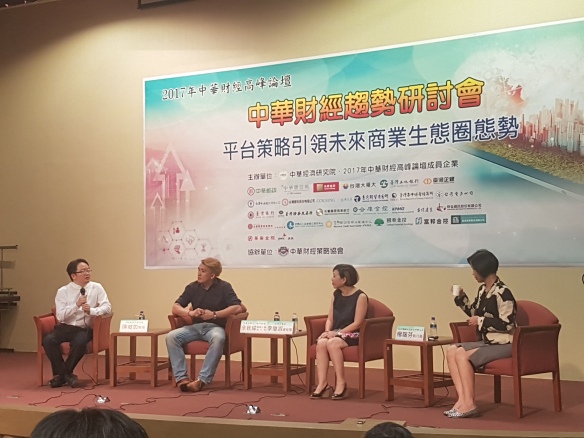
Parking Lot APP CEO Ronald Yu (second from left)
I recently attended a conference in Taipei at which the CEO of parking app 「停車大聲公」 (ParkingLotApp) Roland Yu (余致緯) described his company’s transition from a mobile-based valet parking application to an app that provides information to drivers on cheap and convenient parking spots near their destination where they can park themselves, allowing them to pre-book times and check availability. It was an interesting question and answer session and I’ll go into it in more depth in the IP Observer later this month.
What interested me in terms of language, however, was that although his app bears the word 「停車」 (ting2che1), meaning “to park”, Ronald kept using the word “pa車” during his speech.
During his brief introduction to his business, he mentioned that he’d written an article online detailing his company’s transition. On inspection of this, I found that he’s used the term 「泊車」, which although looks temptingly like 「怕」 is pronounced “bo2che1”. So why was he pronouncing it “pa”?
今年3月,我與兩位創辦人創辦了『呼叫阿福』的泊車服務,希望所有跟我們一樣開車的車主,能夠在市區開車時,不需煩惱停車的問題。
In March of this year, I and two other founders established the “Alfred” parking service, in the hope that car owners like us would not have to worry about parking when driving in the downtown area.
As you can see, he actually uses both 「泊車」 and 「停車」 in the quote above. He uses 「泊車」 normally in the context of 「代客泊車」 and 「泊車服務」(valet parking services), whereas he uses 「停車」 to refer to parking one’s own car. Ronald seems to have been more flexible in interchanging the terms while he was speaking, using 「泊車」 for both valet parking and for parking generally.
Taiwan’s Ministry of Education dictionary entry suggested that it was a loan word used to mimic the sound of the word “park” in English:

However, this doesn’t really explain the use of the character 「泊」 when Taiwanese are normally fine with just using English words or letters instead of characters. According to internet forum lore (and this book), the reason the character 「泊」 is used, is because it’s Cantonese pronounciation is “paak3”, which is a lot closer to the English than “bo2”. In Hong Kong 「泊車」 normally refers to parking your own car and valet parking would be 「代客泊車」. 「泊」 is quite a good choice of character to substitute for “park”, given that it means “to moor” as in, “to moor a boat” and “to stop”.
My friend Monica graciously agreed to share the Cantonese pronounciation of 「泊車」 as below:
As no Chinese characters end in a “k” sound in Mandarin, the end of the syllable appears to have been left off in Taiwanese Mandarin.
This is not the only example of Cantonese interpretations of English words being incorporated into Taiwanese Mandarin and their final consonant being chopped off.
Another example is the (by now a little old fashioned) use of the phrase 「好有fu~」 to mean that something “really has atmosphere/impact”. After its initial adoption, people were quick to point out that “fu” was actually a corruption of the English word “feel”. The rebellious sensibilities of the major contributors to the Taiwan university student’s bible – the ptt bulletin board system – endowed the “fu” pronounciation with an ironic cult status, suggesting it was less pretentious than chucking a full-blown English word into a Chinese sentence.

Someone has typed “好有fu!?” on this screenshot, taken from this clip of a IN NO WAY misogynistic game of spank the model on the bum
If you listen to the clip you can also hear someone using the more pretentious version 「好有feel」 in the background:

“…suggesting it was less pretentious than chucking a full-blown English word into a Chinese sentence.”
It’s like pronouncing “croissant” the French way when buying them in some US cities. The looks you get…